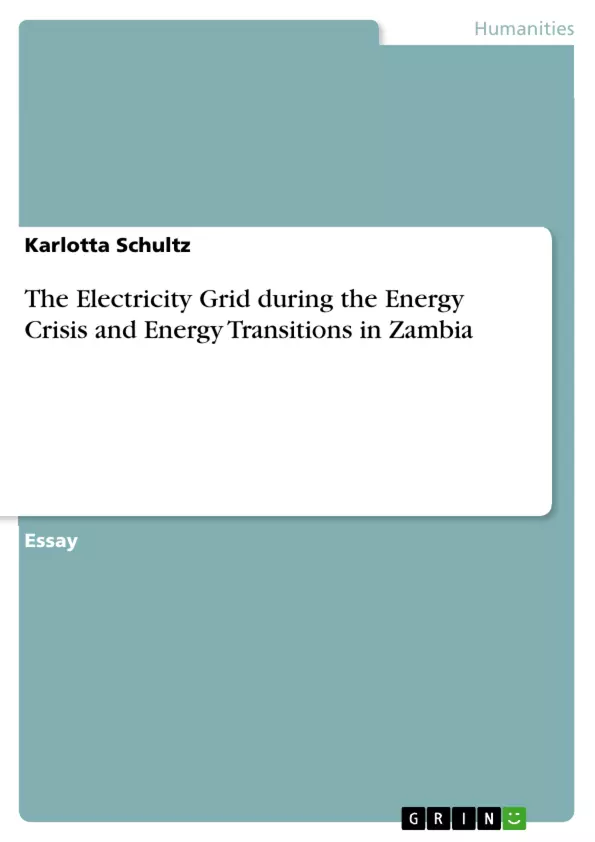This essay will firstly outline the meaning of electricity and the grid in anthropology and social science. Secondly, it will take a look at the events in Zambia which accumulated to the so called 'energy crisis'. Thirdly, it will discuss the experiences made by Zambians during this period and their interconnectedness to social and political life, and fourthly, analyse the dependencies of the envisioned transformation on historical structures and current practices that are manifested in the grid.
Zambia is at the juncture of forming the future of its energy sector. The energy crisis from 2015-2017 revealed the vulnerability of the power generation sector, which is largely dominated by huge hydro-electric power projects from the late 1950s, and led to an increased political and social awareness for the necessity of an energy transformation in the country.
While the energy crisis has brought into light the entanglement of political and economic interests and social inequalities which are strongly connected to the powerful copper industry and its emergence during the colonial era, these patterns are likely to be reproduced channelled by their manifestation in the grid infrastructure. Thus, the questions arise how the electricity grid and its breakdown mediated and exacerbated inner-societal imbalances, and how the crisis that was tied to this infrastructure opened up one particular way of overcoming it.
Inhaltsverzeichnis (Table of Contents)
- Introduction
- The Zambian Energy Crisis and the Grid
- The Grid as Manifestation of the Social Power Relations
- Copper, Hydropower and the Zambian Energy Crisis (2015-2017)
- Experiencing the Energy Crisis
- Postcolonial Trajectories and Current Attempts for an Energy Transition
- Conclusion
Zielsetzung und Themenschwerpunkte (Objectives and Key Themes)
This essay aims to analyze the Zambian energy crisis from 2015-2017, focusing on the role of the electricity grid and its impact on societal imbalances. It explores the connections between the crisis, historical power structures, and the possibilities for a sustainable energy transition in Zambia.
- The social and political implications of electricity grids and their breakdown
- The historical context of the Zambian energy crisis, including colonial legacies and copper mining
- The role of hydropower projects in national development and the challenges of achieving sustainable energy transitions
- The experiences of Zambians during the energy crisis and their relationship to social and political life
- The influence of power relations and infrastructure on energy access and socio-economic development in the global South
Zusammenfassung der Kapitel (Chapter Summaries)
- Introduction: This chapter introduces the context of Zambia's energy sector and its current transformation. It highlights the vulnerability of the predominantly hydro-dependent power generation sector exposed during the 2015-2017 energy crisis. It also introduces the core questions regarding the role of the grid in mediating social inequalities and the prospects for an energy transition.
- The Zambian Energy Crisis and the Grid: This chapter delves into the social and political dimensions of electricity, demonstrating how the grid serves as a manifestation of power relations. It examines the interplay of copper mining, hydropower projects, and the energy crisis, tracing the impact of colonialism and postcolonial trajectories on Zambia's energy landscape.
Schlüsselwörter (Keywords)
This essay focuses on the themes of energy crisis, electricity grids, social power relations, postcolonialism, copper mining, hydropower, energy transition, and sustainable development in the context of Zambia.
Frequently Asked Questions
What caused the Zambian energy crisis of 2015-2017?
The crisis was caused by the vulnerability of the hydropower-dependent sector, combined with the historical entanglement of political and economic interests tied to the copper industry.
How does the electricity grid manifest social power relations?
Anthropologically, the grid is seen as a manifestation of historical structures (colonial era) and social inequalities, where access and reliability often follow political and economic power lines.
What role does the copper industry play in Zambia's energy sector?
The copper industry is a powerful economic driver that emerged during the colonial era and has historically dictated much of the hydropower infrastructure development.
What are the goals of the envisioned energy transformation in Zambia?
The goal is to move towards a more sustainable and less vulnerable energy sector, though the essay warns that current practices might reproduce old inequalities.
How did Zambians experience the energy crisis?
The crisis led to widespread social and political awareness of the sector's fragility and exacerbated existing inner-societal imbalances caused by power shortages.
- Quote paper
- Karlotta Schultz (Author), 2018, The Electricity Grid during the Energy Crisis and Energy Transitions in Zambia, Munich, GRIN Verlag, https://www.grin.com/document/900219



